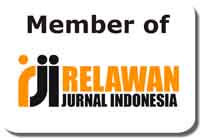Developing A Flipbook for Introduction to English Grammar Course with Project-Based Learning Approach
Abstract
Keywords
Full Text:
PDFReferences
Almuslamani, H. A., Nassar, I. A., & Mahdi, O. R. (2020). The Effect of Educational Videos on Increasing Student Classroom Participation: Action Research. International Journal of Higher Education, 9(3), 323. https://doi.org/10.5430/ijhe.v9n3p323
Bell, H., & Ainsworth, S. (2021). Difficulties assessing knowledge of grammatical terminology: Implications for teacher education and teaching. Language Awareness, 30(2), 97–113. https://doi.org/10.1080/09658416.2020.1752701
Derakhshan, A., & Karimi, E. (2015). The Interference of First Language and Second Language Acquisition. Theory and Practice in Language Studies, 5, 2112. https://doi.org/10.17507/tpls.0510.19
Ellis, R. (2006). Current Issues in the Teaching of Grammar: An SLA Perspective. TESOL Quarterly, 40(1), 83–107. https://doi.org/10.2307/40264512
Faulconer, E. K. (2017). Increasing Student Interactions With Learning Objectives. Journal of College Science Teaching, 46(5), 32–38.
Fenn, R., & McGlynn, A. (2018). Teaching Grammar Through Literature: Bringing Language to Life in the Secondary Classroom. Routledge.
Gall, M. D., Gall, J. P., & Borg, W. R. (2014). Applying Educational Research: How to Read, Do, and Use Research to Solve Problems of Practice. Pearson Education.
García, E. M., & Martínez, V. G. M. (2018). Students’ Reactions to Teacher Corrective Feedback to Oral Production: A Study on Self-correction and Autonomy in Compulsory EFL University Courses. 42(1).
Gras-Velazquez, A. (2019). Project-Based Learning in Second Language Acquisition: Building Communities of Practice in Higher Education. Routledge.
Guo, P., Saab, N., Post, L. S., & Admiraal, W. (2020). A review of project-based learning in higher education: Student outcomes and measures. International Journal of Educational Research, 102, 101586. https://doi.org/10.1016/j.ijer.2020.101586
Iamsirirak, E. (2022). The Development of English Grammar for Teachers Coursebook. rEFLections, 29(3), 503–525. https://doi.org/10.61508/refl.v29i3.261159
Kemp, K. (2021). Test Corrections Appear To Benefit Lower-Achieving Students in an Introduction to Biology Major Course: Results of a Single-Site, One-Semester Study. Journal of Microbiology & Biology Education, 22(2), e00122-21. https://doi.org/10.1128/jmbe.00122-21
Kurtaj, S. (2021). The Use of Dictogloss Technique in Teaching Grammar Through Writing. European Journal of Language and Literature, 7(2), 85–91. https://doi.org/10.26417/693gkc38m
Li, J., & Wu, C.-H. (2023). Determinants of Learners’ Self-Directed Learning and Online Learning Attitudes in Online Learning. Sustainability, 15(12), Article 12. https://doi.org/10.3390/su15129381
Maphalala, M. C., Mkhasibe, R. G., & Mncube, D. W. (2021). Online Learning as a Catalyst for Self-Directed Learning in Universities during the COVID-19 Pandemic. Research in Social Sciences and Technology, 6(2), 233–248. https://eric.ed.gov/?id=EJ1317068
McKenna, P. (2019). Multiple choice questions: Answering correctly and knowing the answer. Interactive Technology and Smart Education, 16(1), 59–73. https://doi.org/10.1108/ITSE-09-2018-0071
Miranda, J. P. S., Fallas, E. Q., Blanco, M. R., Salas, D. B., Alfaro, L. D. M., & Vásquez, J. M. V. (2018). Consciousness raising tasks for the learning of grammar in high school English language classrooms. Actualidades Investigativas En Educación, 18(3), 1–27. https://www.redalyc.org/journal/447/44759784005/html/
Nurcahyoko, K. (2015). Project-Based Collaborative Writing In Teaching Grammar For Students With High And Low Motivation. JELE (Journal Of English Language and Education), 1. https://doi.org/10.26486/jele.v1i2.161
Paraskevas, C. (2020). Exploring Grammar Through Texts: Reading and Writing the Structure of English. Routledge.
Ragupathi, K., & Lee, A. (2020). Beyond Fairness and Consistency in Grading: The Role of Rubrics in Higher Education. In C. S. Sanger & N. W. Gleason (Eds.), Diversity and Inclusion in Global Higher Education (pp. 73–95). Springer Singapore. https://doi.org/10.1007/978-981-15-1628-3_3
Ray, A. (2018). Grammar in Project Based Language Teaching: A Case Analysis. Journal on English Language Teaching, 8(1), 56–62. https://eric.ed.gov/?id=EJ1269005
Rozi, F., Ramdlani, M., Najah, F., Azizah, N., Niswa, H., Abdillah, M., & Rozi, F. (2021). Distance Learning and Independent Learning of Students in Higher Education. Journal of Physics: Conference Series, 1899(1), 012177. https://doi.org/10.1088/1742-6596/1899/1/012177
Ruf, A., Zahn, C., Roos, A.-L., & Opwis, K. (2023). How do enhanced videos support generative learning and conceptual understanding in individuals and groups? Educational Technology Research and Development. https://doi.org/10.1007/s11423-023-10275-4
Sangeetha, V. (2020). Inculcating Self-editing Skills for Enhancing Writing Skills of the EFL Students. International Journal of Instruction, 13(1), 509–322. https://doi.org/10.29333/iji.2020.13133a
Silverman, D. (2020). Qualitative Research. SAGE.
Smith, R., Snow, P., Serry, T., & Hammond, L. (2021). The Role of Background Knowledge in Reading Comprehension: A Critical Review. Reading Psychology, 42(3), 214–240. https://doi.org/10.1080/02702711.2021.1888348
Thelander, T. (2021). Grammar in coursebooks? An examination of how three coursebooks for the subject of English in Swedish upper-secondary school take account of grammar (p. 22). Jönköping University. https://www.diva-portal.org/smash/get/diva2:1706282/FULLTEXT01.pdf
Thornbury, S. (2008). How to Teach Grammar. Pearson Education.
Xu, X., Kauer, S., & Tupy, S. (2016). Multiple-choice questions: Tips for optimizing assessment in-seat and online. Scholarship of Teaching and Learning in Psychology, 2(2), 147–158. https://doi.org/10.1037/stl0000062
Yang, J. (2020). Using Contextualized Materials to Teach English Grammar [The University of San Francisco]. . https://repository.usfca.edu/capstone/1108
Zhong, X., & Wakat, G. (2023). Enhancing grammar proficiency of EFL learners through corpus-integrated lessons. Ampersand, 11, 100139. https://doi.org/10.1016/j.amper.2023.100139.
DOI: http://dx.doi.org/10.31332/lkw.v0i0.7880
Copyright (c) 2024 Rolisda Yosintha, Agnira Rekha, Dwitiya Ari Nugrahaeni, Fitrotun Maulani

This work is licensed under a Creative Commons Attribution-ShareAlike 4.0 International License.
Langkawi: Journal of The Association for Arabic and English indexed by:


















.png)
.png)

.png)
2.png)








